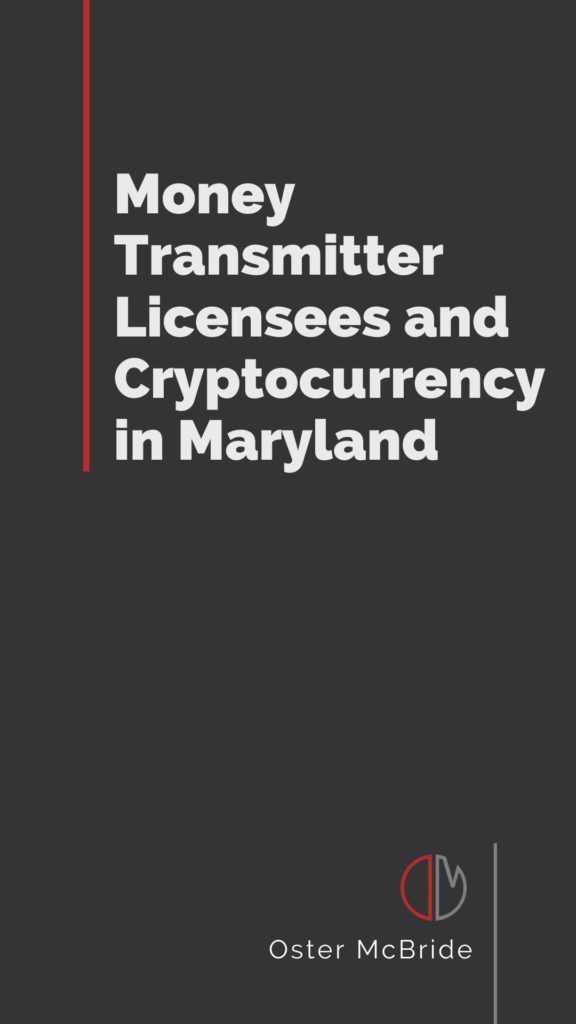
Money Transmitter Licensees and Cryptocurrency in Maryland
Written by: Maria Russinovich
While nationally, there are few regulations on cryptocurrencies like Bitcoin and Ethereum, the individual states often regulate how cryptocurrency is transmitted. For many states, businesses that transmit or deal with currencies of different kinds must have Money Transmitter Licenses that allow them to provide money transmission services, including check processing, cash transmission, money wiring, and other means of distributing currency. A pressing question now is whether the transmission of crypto will require these money transmitter licenses.
The status of crypto licensing in the State of Maryland may be poised to change. Maryland already requires money transmitter licenses for other currencies. In 2018, House Bill 1634 and Senate Bill 1068 were introduced in the Maryland legislature. These bills would allow the Maryland Financial Consumer Protection Commission to oversee cryptocurrencies, initial coin offerings, crypto exchanges, and blockchain technologies.
These bills are commonly referred to as the Financial Consumer Protection Act of 2018. They require the Commission to suggest state-sanctioned actions to regulate cryptocurrencies in the 2018 report to the Governor and General Assembly.
The bill also required the state to assess whether “the commissioner has enough statutory authority to regulate “Fintech” firms or technology-driven nonbank companies who compete with traditional methods in the delivery of financial services.”
In conjunction with the 2018 bills, the State Financial Consumer Protection Commission reported that the State does not require a license or registration for companies that merely hold cryptocurrencies. The Department of Labor, Licensing and Regulation, however, issued a warning to consumers about the potential dangers of virtual currency, which notes that because Maryland does not have regulations of cryptocurrencies at the moment, “[a]n administrator or exchanger that accepts and transmits a convertible virtual currency or buys or sells convertible virtual currency for any reason is a money transmitter under federal regulations.”
In 2019, Senate Bill 786 was introduced as the “Financial Consumer Protection Act of 2019,” which would require money transmitters to keep and hold a certain threshold amount of virtual currency under specific circumstances.
House Bill 1301, introduced on February 25, 2021, would require certain cryptocurrency businesses that qualify as “marketplace facilitators” to collect “the sales and use tax on certain sales by a marketplace seller to a buyer in the state under certain circumstances.” Finally, regarding blockchain technology, in 2019, Maryland adopted a senate bill that allows corporations to maintain certain records on a “distributed electronic network or database.”
Sources:
Burt, T. D., Guy, S. M., & Pierce, E. F. (2018, January). 2017 Interim Report. Retrieved July 12, 2021, from http://dls.maryland.gov/pubs/prod/NoPblTabMtg/MdFinProtCmsn/2017-Interim-Report.pdf
Financial Consumer Protection Act of 2018. (2018, October 1). Retrieved July 12, 2021, from https://mgaleg.maryland.gov/mgawebsite/legislation/details/hb1634?ys=2018rs
HOUSE BILL 1634. (2018, October 1). Retrieved July 12, 2021, from https://mgaleg.maryland.gov/2018RS/bills/hb/hb1634E.pdf
Money Transmitter – Financial Regulation. (n.d.). Retrieved July 12, 2021, from https://www.dllr.state.md.us/finance/industry/moneytran.shtml
State Regulations on Virtual Currency and Blockchain Technologies (Updated March 2021). (2017, October 17). Retrieved July 12, 2021, from https://www.jdsupra.com/legalnews/state-regulations-on-virtual-currency-2160466/
VIRTUAL CURRENCIES: RISKS FOR BUYING, SELLING, TRANSACTING, AND INVESTING. (2014, April 24). Retrieved July 12`, 2021, from http://www.dllr.state.md.us/finance/advisories/advisoryvirtual.pdf
Recent Posts
